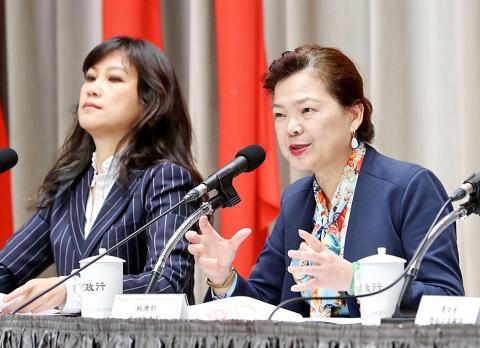The Ministry of Economic Affairs (MOEA) yesterday proposed a program to assist small and medium-sized enterprises facing financial difficulties from an outbreak of COVID-19 in China.
With an estimated NT$16 billion (US$532.68 million) funded by a special budget allocation from the Executive Yuan, the ministry said it plans to subsidize interest on loans to small and medium-sized businesses, while setting aside NT$10 billion for the Small and Medium Enterprise Credit Guarantee Fund of Taiwan.
“We would allocate about NT$2.5 billion to help companies with their loan interest ... through an estimated 1.06 percent reduction in the interest rate,” Small and Medium Enterprise Administration (SMEA) Director-General Ho Chin-tsang (何晉滄) said by telephone.

Photo: CNA
A similar offer would be made to companies looking to take out new loans, Ho said.
“With Chinese tourists banned and most people staying home to avoid catching the virus, restaurants, shops and other tourist venues are having to resort to taking out new loans as they struggle to pay their bills and employees,” he said.
The Directorate-General of Budget, Accounting and Statistics on Wednesday trimmed its forecast for GDP growth to 2.37 percent this year, down from its previous estimate of 2.72 percent, citing the outbreak’s effects on domestic consumption and exports.
Meanwhile, the SMEA would also help companies renegotiate loan terms with their creditors to extend the loan period with lower payments, he added.
The remaining funds would then be used to further stimulate the economy through government-issued coupons and various food and drink festivals, Ho said, adding that they aim to boost consumer spending.
“We would also set up education camps for professional training, help companies digitally transform and promote environmentally friendly business practices,” Ho said.
Meanwhile, Vice Minister of Economic Affairs Wang Mei-hua (王美花) said that a ban on mask exports would be extended from Feb. 23 until the end of April.
The same would apply for the government’s centralized mask distribution policy to ensure a steady domestic supply amid the outbreak, Wang said.
If the virus situation improves, those measures might be lifted earlier, she said.
The ministry has since last week increased production of masks to more than 4.2 million per day as it added an additional 60 production lines, seeking to produce 10 million masks per day by the end of next month.
Separately yesterday, the ministry approved Hushan Autoparts Inc’s (虎山實業) application to join a government-subsidized plan to invest in Taiwan.
Hushan, the world’s largest auto handle manufacturer, is to invest NT$1.2 billion to establish a fifth production plant in New Taipei City’s Rueifang Industrial Park (瑞芳工業區).
The company would use automated production lines at the plant, where it plans to hire 152 workers, the ministry said.

South Korea’s equity benchmark yesterday crossed a new milestone just a month after surpassing the once-unthinkable 5,000 mark as surging global memory demand powers the country’s biggest chipmakers. The KOSPI advanced as much as 2.6 percent to a record 6,123, with Samsung Electronics Co and SK Hynix Inc each gaining more than 2 percent. With the benchmark now up 45 percent this year, South Korea’s stock market capitalization has also moved past France’s, following last month’s overtaking of Germany’s. Long overlooked by foreign funds, despite being undervalued, South Korean stocks have now emerged as clear winners in the global market. The so-called “artificial intelligence

‘SEISMIC SHIFT’: The researcher forecast there would be about 1.1 billion mobile shipments this year, down from 1.26 billion the prior year and erasing years of gains The global smartphone market is expected to contract 12.9 percent this year due to the unprecedented memorychip shortage, marking “a crisis like no other,” researcher International Data Corp (IDC) said. The new forecast, a dramatic revision down from earlier estimates, gives the latest accounting of the ongoing memory crunch that is affecting every corner of the electronics industry. The demand for advanced memory to power artificial intelligence (AI) tasks has drained global supply until well into next year and jeopardizes the business model of many smartphone makers. IDC forecast about 1.1 billion mobile shipments this year, down from 1.26 billion the prior

People stand in a Pokemon store in Tokyo on Thursday. One of the world highest-grossing franchises is celebrated its 30th anniversary yesterday.

NEW IDENTITY: Known for its software, India has expanded into hardware, with its semiconductor industry growing from US$38bn in 2023 to US$45bn to US$50bn India on Saturday inaugurated its first semiconductor assembly and test facility, a milestone in the government’s push to reduce dependence on foreign chipmakers and stake a claim in a sector dominated by China. Indian Prime Minister Narendra Modi opened US firm Micron Technology Inc’s semiconductor assembly, test and packaging unit in his home state of Gujarat, hailing the “dawn of a new era” for India’s technology ambitions. “When young Indians look back in the future, they will see this decade as the turning point in our tech future,” Modi told the event, which was broadcast on his YouTube channel. The plant would convert